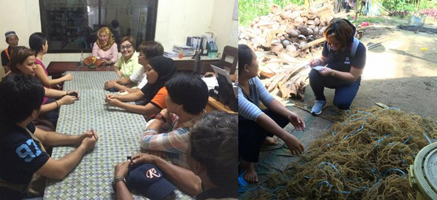![Community activities in Datu Abdulla Sangki, Maguindanao (Left) and in Suralla, South Cotabato (Right). (Image credit: Diana Rose P. Cabello, Technology Transfer and Promotion Division [TTPD], PCAARRD)](/images/stories/2017/img081519_modality01.jpg) Sustainable and resilient agriculture, aquatic, and natural resources (AANR)-based communities can be achieved through science and technology. This is possible through the technology modality developed by the Philippine Council for Agriculture, Aquatic and Natural Resources Research and Development of the Department of Science and Technology (DOST-PCAARRD).
Sustainable and resilient agriculture, aquatic, and natural resources (AANR)-based communities can be achieved through science and technology. This is possible through the technology modality developed by the Philippine Council for Agriculture, Aquatic and Natural Resources Research and Development of the Department of Science and Technology (DOST-PCAARRD).
Coined Science and Technology Community-based for Inclusive Development (STC4iD), the modality aims to demonstrate an extension modality for the geographically, economically, and socially disadvantaged (GESDA) communities and social groups in the AANR sector. This is to help them establish sustainable and resilient community-based livelihoods through inclusive development.
STC4iD will serve as a vehicle for reaching the stakeholders at the grassroots level by bridging the gaps in technology, information, and social practices; thereafter, assuming a critical role in alleviating poverty and developing empowered communities in the AANR sector.
It specifically aims to empower and capacitate disadvantaged AANR-dependent communities and social groups, especially from the poorest provinces, to establish sustainable and resilient community-based livelihoods through combined technical and economic activities; promote wider adoption of the extension modality through awareness and policy activities; forge new and expanded partnerships through the DOST Regional Offices (ROs) and the R&D Regional consortia; and increase average household income in S&T community livelihood sites by meeting the food threshold during the first and second year.
 Beneficiaries include poverty-stricken areas, indigenous people, conflict-vulnerable communities, coastal fishing communities, and upland farm communities.
Beneficiaries include poverty-stricken areas, indigenous people, conflict-vulnerable communities, coastal fishing communities, and upland farm communities.
Social preparation and planning, capacity building, techno demonstration farm, and technical and economic suitability support are the components of the modality.
One example of an STC4iD project is the completed project on emergency relief after the Marawi Crisis.
Other projects still being conducted are on fisheries, native pig, native chicken, vegetables, mushroom, cassava, and diversified farming in six different regions.
